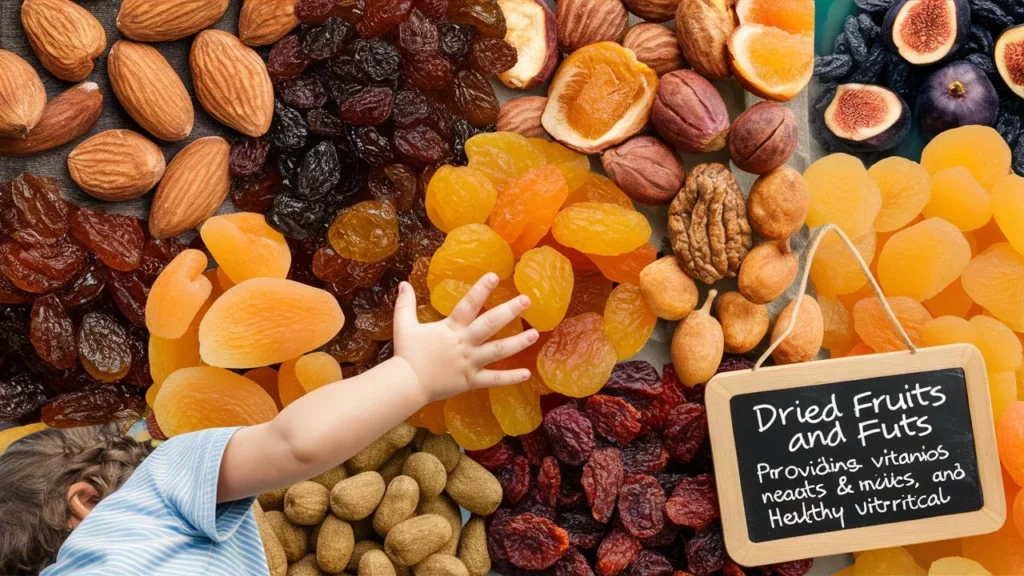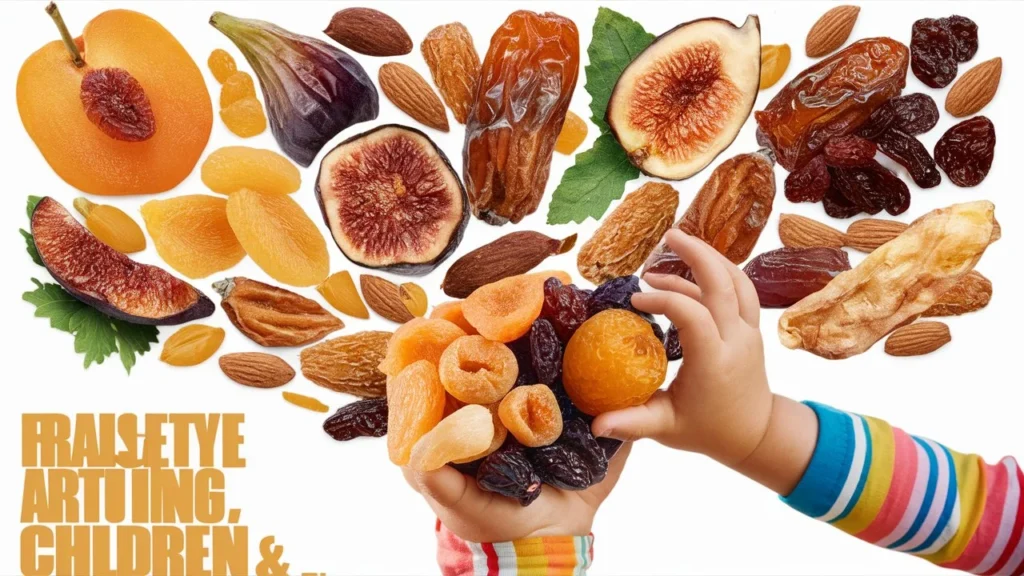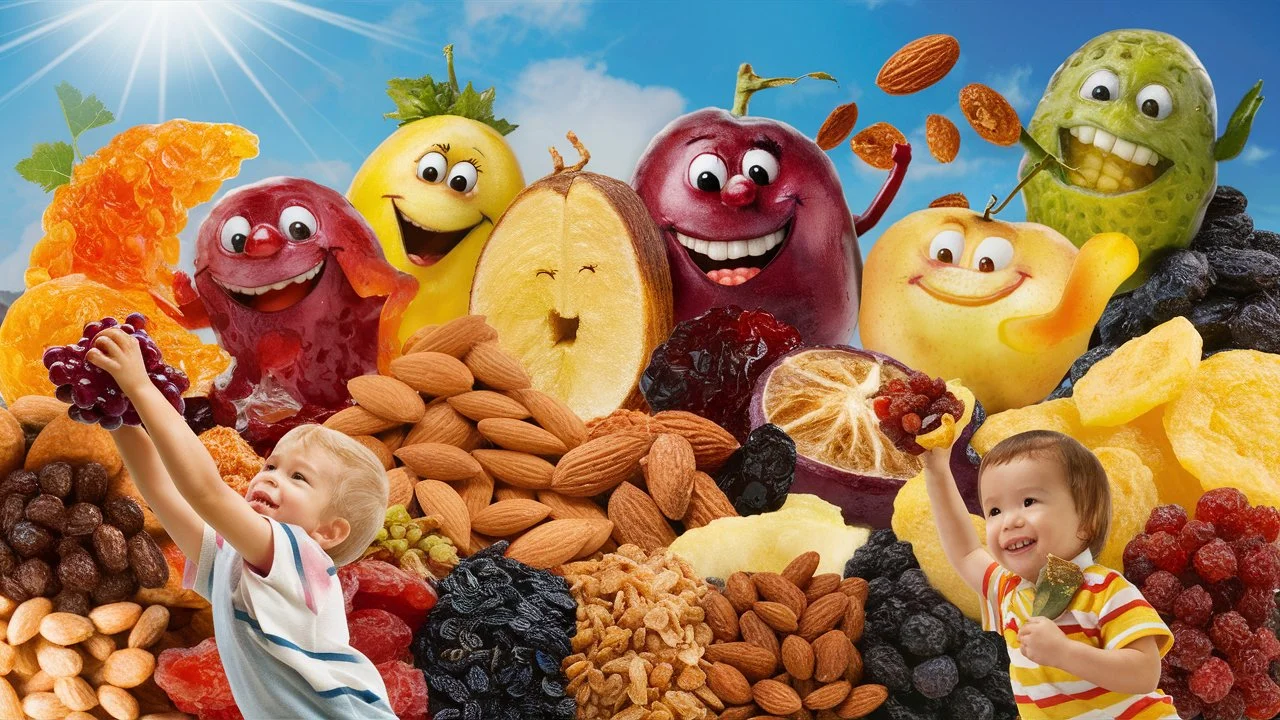Dried Fruits: Essential Nutrition for Growing Children
Table of Contents
Introduction
As a parent, you want to ensure your child is getting all the nutrients they need for growth, development, and overall health. While fresh fruits are a well-known source of vitamins and minerals, dried fruits are often overlooked. But dried fruits—naturally sweet, easy to pack, and nutrient-dense—can offer essential benefits that support growing bodies and active minds. In this guide, you’ll discover why dried fruits are a valuable addition to your child’s diet, their unique benefits, and how to incorporate them into everyday meals and snacks.
Section 1: What Makes Dried Fruits So Nutritious?
Dried fruits are simply fresh fruits that have had most of their water content removed. This process concentrates their flavors and nutrients, making them a convenient and nutrient-dense food source. Here are some common dried fruits and their nutritional highlights:
| Dried Fruit | Key Nutrients | Health Benefits |
|---|---|---|
| Raisins | Iron, Potassium, Fiber | Supports energy, boosts digestion |
| Apricots | Vitamin A, Vitamin C, Potassium | Enhances immunity, supports eye health |
| Prunes | Fiber, Vitamin K, Magnesium | Promotes healthy digestion, bone strength |
| Dates | Fiber, Iron, B Vitamins | Provides sustained energy, brain support |
| Figs | Calcium, Iron, Potassium | Supports bone health, muscle function |
With nutrients concentrated in smaller servings, dried fruits are ideal for children who may not always eat a full serving of fresh fruits.

Section 2: Nutritional Comparison – Dried vs. Fresh Fruits
Dried fruits provide similar nutrients to fresh fruits but in a more compact form, making them ideal for children with smaller appetites or busy schedules.
| Aspect | Fresh Fruits | Dried Fruits |
|---|---|---|
| Water Content | High | Low |
| Shelf Life | Short (days to weeks) | Long (months to years) |
| Nutrient Density | Moderate | High |
| Sugar Concentration | Lower (diluted natural sugars) | Higher (concentrated natural sugars) |
Key Point: Both fresh and dried fruits have unique benefits. While fresh fruits provide hydration, dried fruits offer high-density nutrients and are a great choice for energy-packed snacks.
Section 3: Health Benefits of Dried Fruits for Children

Dried fruits deliver essential nutrients for growing children, including fiber, vitamins, and minerals that support key areas of health.
3.1 Digestive Health
Dried fruits are rich in fiber, which is essential for healthy digestion. Fiber helps regulate bowel movements, preventing constipation. For instance, prunes and figs are known for their natural laxative effects due to both their fiber content and unique compounds.
3.2 Energy Boosting
With their natural sugars, dried fruits like dates and raisins are a quick source of energy, perfect for after-school activities or a pre-sports snack. This slow-release energy supports sustained physical and mental activity without causing spikes in blood sugar.
3.3 Bone and Muscle Development
Calcium and potassium are abundant in dried fruits like figs and apricots, contributing to bone strength and muscle function. These nutrients are especially important during peak growth phases in childhood and adolescence.
| Dried Fruit | Specific Health Benefit |
|---|---|
| Prunes | Supports digestion and regularity |
| Raisins | Provides energy, supports dental health |
| Apricots | Enhances vision, boosts immunity |
Section 4: Cognitive Benefits of Dried Fruits for Growing Minds
Good nutrition is not only crucial for physical growth but also for cognitive development. Here’s how dried fruits can positively impact brain health:
- Iron for Cognitive Function: Iron is essential for transporting oxygen to the brain, supporting memory, attention, and focus. Raisins and dried apricots provide a good source of iron for growing children.
- Vitamin B6 for Brain Health: Dried fruits such as dates and prunes contain Vitamin B6, which supports the production of neurotransmitters that regulate mood and behavior. This is important for learning, memory, and emotional well-being.
- Antioxidants for Mental Clarity: Polyphenols in dried fruits like figs and apricots protect brain cells from oxidative stress, which may support long-term brain health.
| Nutrient in Dried Fruit | Cognitive Benefit |
|---|---|
| Iron | Supports memory and attention |
| Vitamin B6 | Enhances mood, supports brain function |
| Polyphenols | Protects brain cells, reduces inflammation |
Section 5: Age-Appropriate Serving Sizes for Dried Fruits
Since dried fruits are nutrient-dense and higher in sugar per serving compared to fresh fruits, it’s essential to portion them correctly. Here’s a general guide:
| Age Group | Recommended Daily Serving Size |
|---|---|
| 1-3 years | 1/4 cup |
| 4-8 years | 1/4 to 1/2 cup |
| 9-13 years | 1/2 to 3/4 cup |
| 14-18 years | 3/4 to 1 cup |
Serving sizes may vary based on the child’s activity level and dietary needs, so consider adjusting these portions if they are particularly active or need more energy.
Section 6: Practical Ways to Incorporate Dried Fruits into Your Child’s Diet
Adding dried fruits to your child’s diet can be simple and enjoyable. Here are some creative ideas:
- Trail Mix: Create a homemade trail mix with a mix of dried fruits, nuts, and whole-grain cereals. This combination provides fiber, protein, and healthy fats for a balanced snack.
- Yogurt Toppers: Add dried fruits to yogurt or oatmeal to boost flavor and nutrients. This is an easy way to make meals more exciting while delivering essential vitamins and minerals.
- Homemade Energy Bars: Blend dates or figs with oats, nuts, and a touch of honey, then press the mixture into bars. These can be stored in the fridge and used as a convenient snack on the go.
Section 7: Common Questions About Dried Fruits
- Are dried fruits as healthy as fresh fruits?
- Yes, dried fruits retain most of the vitamins and minerals of fresh fruits, but the nutrients are more concentrated. It’s important to monitor portion sizes due to their higher sugar content.
- Can dried fruits help with constipation?
- Yes, dried fruits like prunes and figs are excellent for digestion. Their high fiber content supports bowel regularity and helps alleviate constipation.
- Is there a risk of cavities from eating dried fruits?
- Dried fruits are sticky and can adhere to teeth, increasing the risk of cavities. Encourage your child to rinse their mouth with water or brush their teeth after eating dried fruits to reduce the risk.
- Do dried fruits contain added sugars?
- Some dried fruits have added sugars for sweetness. Check labels and choose varieties labeled as “unsweetened” or “no added sugar” to keep it healthier.
- What are the best dried fruits for brain health?
- Raisins and apricots, rich in iron, and dates, containing B vitamins, are excellent for brain health. These nutrients help with focus, memory, and mental clarity.
Conclusion
Dried fruits are a nutrient-packed addition to your child’s diet, offering essential vitamins, minerals, and fiber to support growth, cognitive health, and energy needs. By choosing unsweetened, preservative-free options and watching portion sizes, you can make dried fruits a regular, beneficial part of their diet. With simple preparation methods and creative ideas, dried fruits can easily become a go-to snack that both you and your child will love.
References
- American Academy of Pediatrics. (Year). Nutritional Needs of Children. Publisher.
- National Institutes of Health. (Year). Dietary Benefits of Dried Fruits. Publisher.
- Journal of Pediatric Nutrition, Author(s). (Year). Effects of Dried Fruits on Cognitive and Physical Health in Children. Journal Name, Volume(Issue), Pages.







